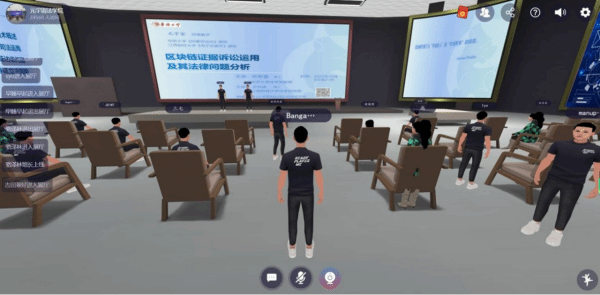Recently, Professor Chen Weixing from Huaqiao University (HQU) and Dr. Xu Linbo from Jiangxi University of Finance and Economics (JUFE) held a cross-school lesson via metaverse platform. The joint lesson on Civil Procedure Law and Electronic Evidence Science under the theme of “Application of Blockchain Evidence in Litigation and Analysis of Relevant Legal Issues” is HQU’s first teaching activity carried out with metaverse technology.
In this lesson, Professor Chen Weixing introduced the principles and classification of blockchain storage technology, analyzed relevant legal issues of blockchain storage based on some typical cases, and evaluated the current legislation on the examination and certification of the technology. Dr. Xu Linbo, a teacher from the School of Law, JUFE, hosted the class, and the innovation team led by Professor Wu Xuyang from the School of Law of Xiamen University provided technical support and guidance throughout the course. More than 50 undergraduate students, graduate students and teachers from three universities in Jiangxi and Fujian provinces participated in the course through virtual space.
The lesson adopted a flipped class mode to make the most of the asynchronous feature of metaverse courses. It started with students entering the virtual class, listening to the lesson recordings and studying the shared course files, during which they could play back for better comprehension. In the second half, Professor Chen Weixing answered the real-time questions raised by students.
Compared with the traditional teaching way that heavily relies on geographic space or online space, the metaverse class provides a multidimensional perspective to reconstruct space. It applies virtual reality to recreate an in-person class atmosphere. Teachers and students could present in virtual images, and a sensory system is simulated and built in. In this metaverse class, more than 50 students registered and logged in to synchronize with the flow. Students can not only choose a personalized virtual image to present and participate in the class from the first-person perspective, but observe the whole classroom and pick their seat from the third-person perspective. They can choose to sit in the front row for a better view. The information interaction and data modeling technology help to reconstruct a virtual classroom with a podium, desks, chairs, projectors, blackboards, computers, and etc. With slides displayed on the background, Professor Chen Weixing delivered his lecture on the metaverse “podium” and the “students” could put up their hand and interact with the teacher if they have any questions.

Metaverse Class
The digitalization of educational products has become an inevitable trend in digital age with high-tech being rapidly introduced and applied in education. In Civil Procedure Law, HQU’s first-class course construction project, Professor Chen Weixing further explored the blended teaching mode by introducing metaverse classes in which students could participate from the first perspective. The new mode helps to increase the visual teaching of specific trial process and some special evidence, activates students to engage in immersive experiential learning in the supporting blockchain case cluster and presents a digital distance teaching reform practice that promotes “active learning”. Professor Chen points out that metaverse classes, as an innovative practice of law education in the field of “new liberal arts” based on the new media technology, can make teachers and students communicate more freely and equally, and students’ active learning and thinking will then be stimulated.
(Editor: Cai Juntao)
